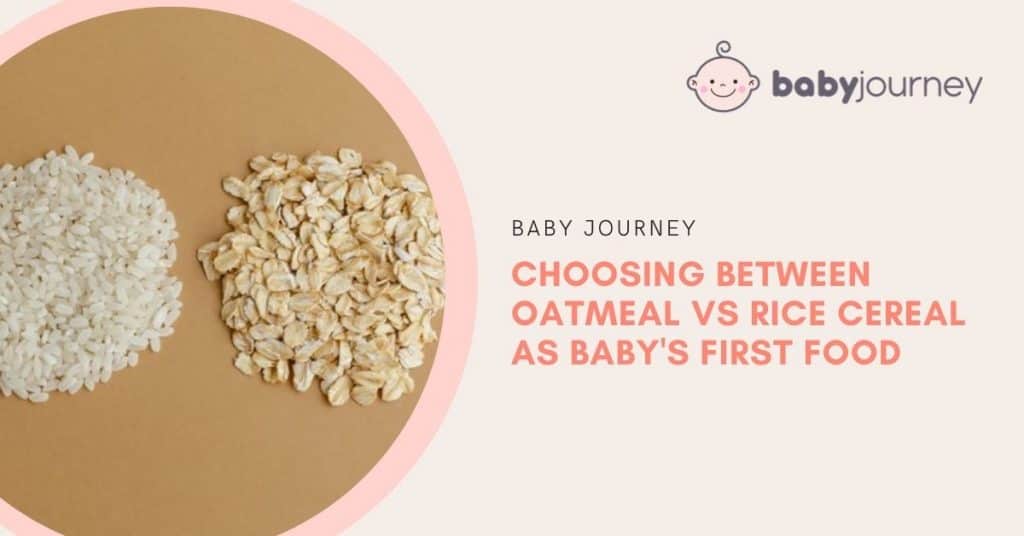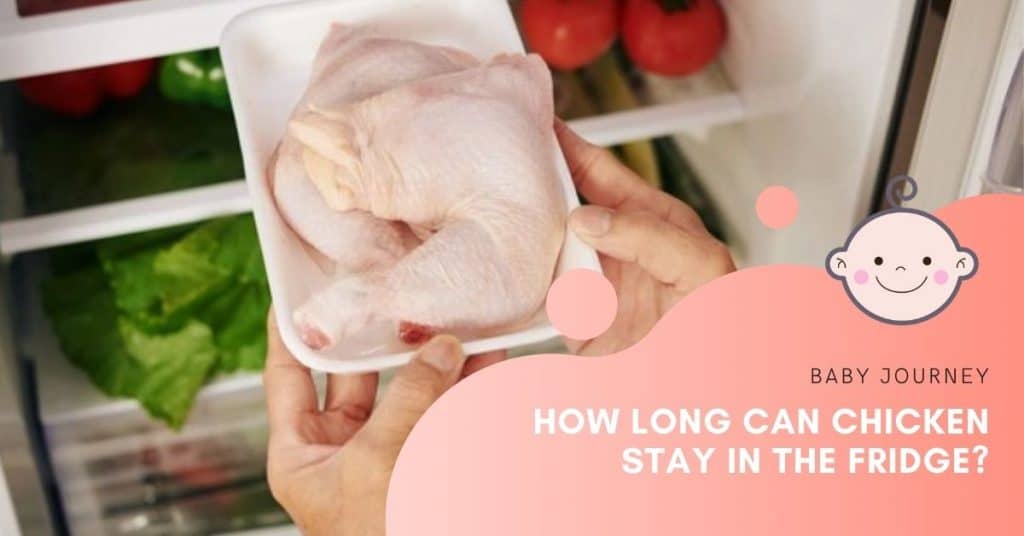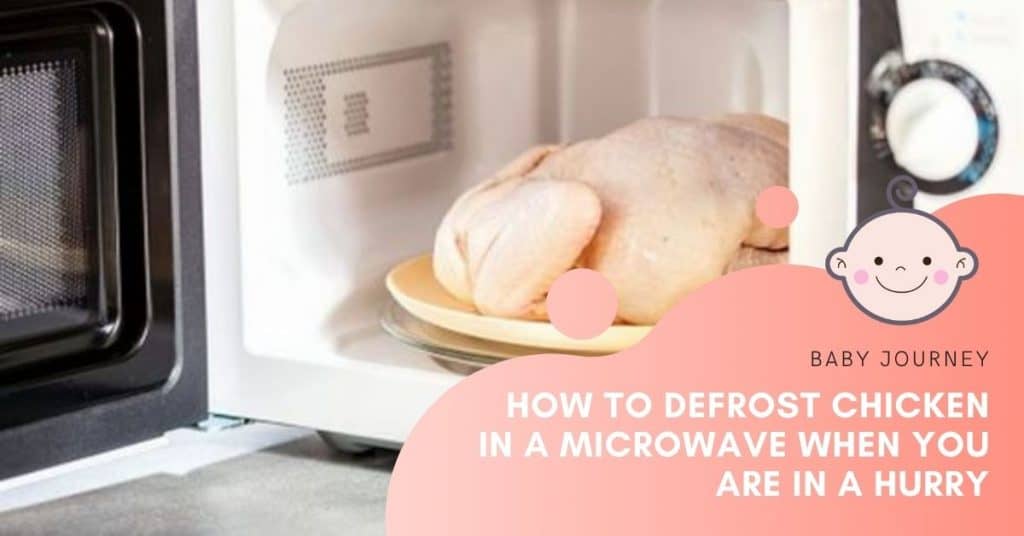Is your baby ready for solid foods? How exciting! However, this opens up a vast new world of parenting decisions. When infants are between four and six months, they can generally start with baby cereals as their first foray into solids.
A common question among parents is this: Which baby cereal is better when it comes to oatmeal vs rice cereal?
Oatmeals and rice cereals are the two most popular baby food options. Some parents choose oatmeal instead of rice cereal while others only offer rice cereal and skip the oatmeal altogether.
We hope to demystify the world of baby cereals with this helpful guide so you can decide whether it will be oatmeal or rice cereal as the first single grain baby food for your precious little one.
- Oatmeal Cereal vs Rice Cereal: What’s the Difference Between the Two Popular Infant Cereals?
- Which One Is Better, Oatmeal or Rice Cereal?
- A Comparison Between Oatmeal vs Rice Cereal
- How to Introduce Cereals to A Baby?
- Best Oatmeal Cereals & Rice Cereals as Baby’s First Foods
- Alternatives to Oatmeal and Rice Cereal
- FAQs
- Which is Better for Your Baby?
Oatmeal Cereal vs Rice Cereal: What’s the Difference Between the Two Popular Infant Cereals?
Let’s start with the obvious, the biggest difference between rice cereal and oatmeal cereal is that oat cereal is made from oats while rice cereal is made from rice grains. When looking at other differences between rice cereal vs oatmeal, flavor and allergenic characteristics are the most notable.
Oatmeal can have a nuttier and earthier flavor. Oats are also a common allergy, and oatmeal may cause a reaction in some infants. Oatmeal cereal is usually very finely ground but can be a touch thicker and coarser than rice.
Rice is very bland and does not have much flavor at all. Rice is not an allergy that most people have, therefore it makes rice cereal a popular choice for baby’s first cereal. The texture of rice cereal is quite smooth and it can be made to be thick or very liquid to resemble breastmilk.
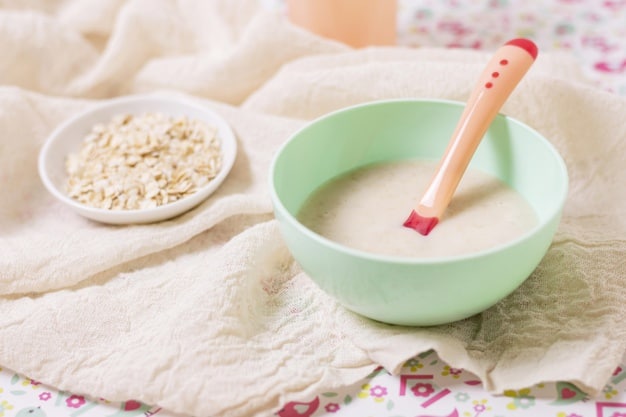
When it comes to nutrition and digestion, there are a few considerations. Oatmeal is generally considered a healthier choice if you are weighing rice or oatmeal cereal for babies. It has wonderful nutritional value; including vitamins and minerals, such as iron and B6, and it is also high in fiber.
The fiber in oatmeal can help remedy some digestive issues. However, if your baby has a gluten allergy oatmeal can lead to gas, constipation, and fussiness.
Rice cereal does not have as rich a nutritional value as oatmeal. You can opt for brown rice cereal, which can provide your child with more energy and sustenance, but it still lacks some vitamins and minerals like manganese, phosphorus, and zinc, which contributes to baby’s cell and bone growth as well as overall immunity.
If you want a cereal that won’t trigger an allergy or cause digestive upset, rice cereal is the best baby cereal for sensitive stomachs. Rice is super easy to digest and known for being gentle on developing digestive tracts.
The differences aren’t major, but they are important enough to consider when you are debating on starting baby on oatmeal vs rice cereal.
Which One Is Better, Oatmeal or Rice Cereal?
While there isn’t a tried and true winner between rice cereal vs oatmeal cereal, one may be better for your baby in particular. The cereal you choose depends on your child’s preferences, health concerns, and your wants and needs as a parent.
Oatmeal vs Rice Cereal for Reflux
All babies have some level of reflux as their digestive systems are still developing. Unfortunately, some children experience reflux more severely. This can lead to crying, fussiness, spitting up, and pain.
If your child is dealing with reflux, doctors typically recommend oatmeal. Oatmeal is thick and its weight can help reduce stomach acid creeping up into the esophagus. Some pediatricians may recommend that you put oatmeal in baby bottle. If you do this you should follow your pediatrician’s instructions explicitly.
Rice cereal used to be a common recommendation for reflux. But the research [1] that has emerged shows too much rice cereal can result in concerning levels of arsenic in children. Oatmeal and other single grain baby foods like quinoa are now recommended instead of rice if you plan to be making additions to your child’s bottle or feeding them cereal for any length of time.
Oatmeal vs Rice Cereal as Baby’s First Cereal
If you are wondering which is the best cereal to start baby on, it really comes down to personal preference. Rice cereal was always the recommended cereal. This was true for a few reasons.
- It is less likely to cause an allergic reaction which can be dangerous in young babies, since it is gluten free
- It is very bland and the taste can be adjusted if you mix it with breast milk or formula. This can make it easier for babies to transition to.
- It is very easy to digest and is suitable for developing tummies.
However, the levels of naturally occurring arsenic are concerning. Most parents don’t feed their baby rice cereal long enough to lead to a build-up of unsafe levels. Still, some parents prefer feeding oatmeal as a first food.
As long as your baby does not have a gluten allergy, oatmeal can be offered as a meal. Some babies may not like the nutty taste or the coarser texture while other infants don’t mind it.
Oatmeal vs Rice Cereal for Babies with Tummy Issues
When comparing oatmeal vs rice cereal for baby is one better for digestive issues? That depends. If your child has a gluten sensitivity, then oatmeal can lead to digestive upset. This may present as gas, constipation, or general fussiness. If you’re deciding on rice cereal or oatmeal for reflux, then oatmeal is commonly prescribed.
If they do not have an allergy the fiber found in oatmeal can be excellent for your child’s gut. It may actually help prevent constipation. However, rice cereal is very gentle on infants’ stomachs. It is easy for them to digest and generally won’t cause many issues.
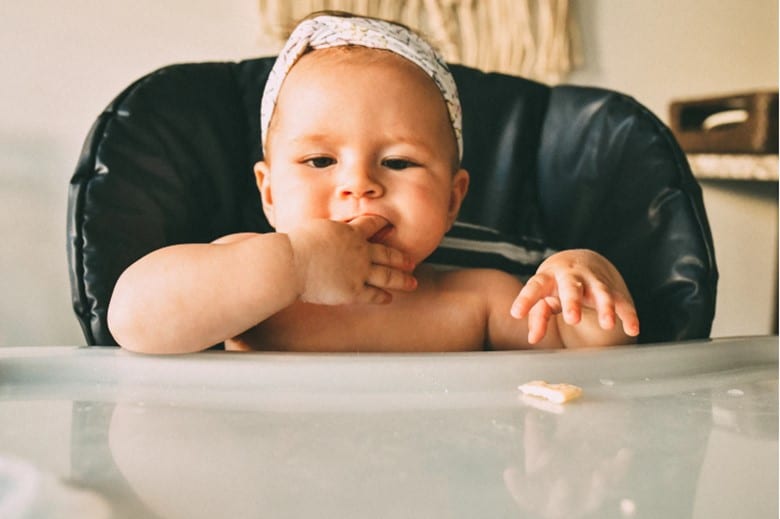
A Comparison Between Oatmeal vs Rice Cereal
Oats and rice can both be a suitable infant cereal choice for your baby. It depends on their preferences and health concerns. However, there are advantages and disadvantages to each cereal.
- High fiber may help with constipation
- Rich in vitamins and minerals
- May help with acid reflux
- Easy to make
- Some babies like nutty flavor and coarse texture
- Easy to digest
- The bland flavor is adaptable with milk, fruits, and veggies
- Smooth consistency
- Easy to make
- Non-allergenic for those with gluten-intolerance
- Contains gluten which may trigger allergic reactions and sensitivities
- Coarse texture can make the transition from breast milk or formula more difficult
- Some infants do not like the taste
- Not as nutritional as oatmeal
- Concerning arsenic levels
- High fiber may help with constipation
- Rich in vitamins and minerals
- May help with acid reflux
- Easy to make
- Some babies like nutty flavor and coarse texture
- Contains gluten which may trigger allergic reactions and sensitivities
- Coarse texture can make the transition from breast milk or formula more difficult
- Some infants do not like the taste
- Easy to digest
- The bland flavor is adaptable with milk, fruits, and veggies
- Smooth consistency
- Easy to make
- Non-allergenic for those with gluten-intolerance
- Not as nutritional as oatmeal
- Concerning arsenic levels
How to Introduce Cereals to A Baby?
When your baby is ready for solids, at about six months or so, you can introduce cereals. Be sure to get the go-ahead from your pediatrician first.
The best way to introduce cereals is to create a very thin mixture. You can do this by mixing it with breastmilk or formula. You could also use water but using milk increases the cereal’s nutritional value.
At first, your child will be unsure. The texture and flavor are something new. They will likely just move the food about their mouth and probably won’t eat very much. This is okay!
Before age one the predominant source of food for babies is breastmilk or formula. While cereal provides some nutrients, it is more of a learning experience at this stage. It helps to strengthen their tongue and mouth. As well as to develop the movements necessary to get food from the front to the back of their mouths and swallow.

To start, babies only need 1 to 2 tablespoons of cereal a day. You can slowly increase this to 1 to 4 tablespoons of cereal once or twice a day. As your baby grows they will likely want other purees and foods instead of cereal. While you can still mix cereal with things like fruits and vegetables for them to eat, feeding your child rice cereals or oatmeal cereals long-term isn’t necessary (or recommended in the case of rice).
When introducing cereal you should not add it to bottles. Only add rice or oatmeals to bottles if advised by your doctor. This can be a treatment for acid reflux in some scenarios. Thickening a bottle with infant cereal like rice or oatmeal cereals is usually not advised and will not make your child sleep longer.
Best Oatmeal Cereals & Rice Cereals as Baby’s First Foods
There are many oatmeal and rice first cereals for you to choose from! These are my favorite brands:
#1: Happy Baby Clearly Crafted Oatmeal Baby Cereal

Happy Baby’s oatmeal is made with organic whole grains and free of harmful additives. It only has three ingredients! The addition of iron helps boost its nutritional content. Simply add milk, formula, or water, stir and serve!
- Clearly Crafted Cereal: Made with organic oats, Vitamin C & iron that helps support baby's brain development, the silky-smooth texture of this organic, whole grain Cereal is ideal for babies exploring taste & texture Bonus: it comes in a resealable pack!
- Organic Whole Grain Cereal: Happy Baby's Whole Grain Oats & Quinoa and Whole Grain Oatmeal Clearly Crafted Cereals are designed with simple, organic ingredients like whole grain oats and quinoa with 45% DV of iron to help support baby's brain development
- Happy Baby: We provide organic, delicious options for your baby's nutritional journey; Happy Baby offers baby food pouches, organic cereals, teething wafers, baby snacks and more made for your little one
#2: Holle Organic Oatmeal Cereal
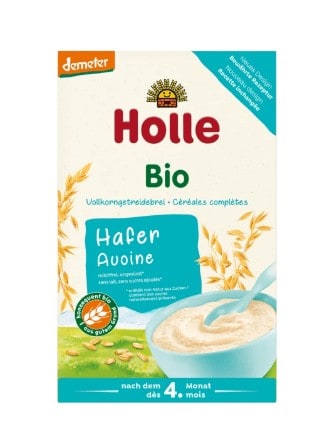
Clean and simple, this organic, non-GMO oatmeal doesn’t contain any additives. Holle’s oatmeal cereal is made with whole grain oat flour for a smooth consistency. It is also free of milk and added sugar.
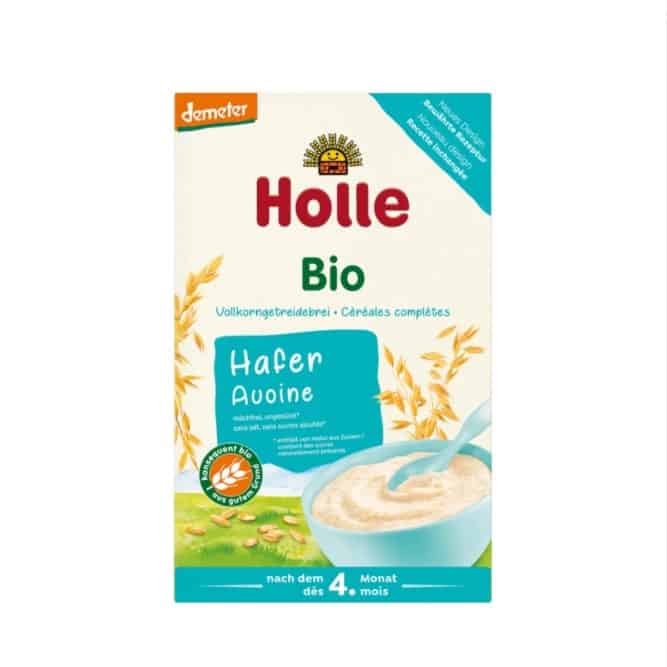
Holle Organic Oatmeal Cereal, 250g
- Non-GMO cereal made with whole grain oat flour
- Cereal is Demeter Certified & Organic by EU standards
- Suitable for 4 months plus
#3: Earth’s Best Organic Rice Cereal
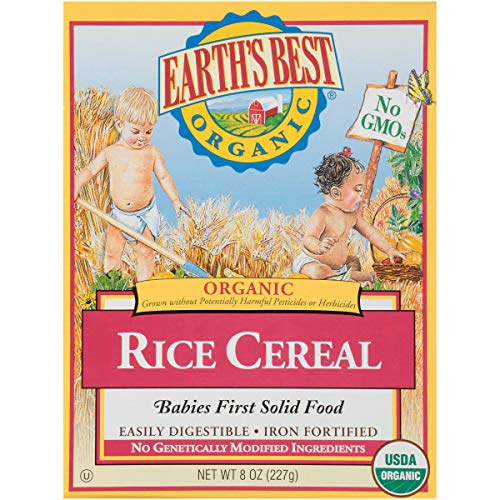
This rice cereal is very gentle on your child’s stomach. It is organic and non-GMO. Fortified with iron, the Earth’s Best Organic Rice Cereal is a good baby cereal choice for your baby to eat as a meal.
- Twelve 8 oz. boxes of Earth's Best Organic Infant Cereal, Rice Cereal
- Made with organic rice grains and fortified with iron
- For infants transitioning to solid foods
#4: Holle Organic Baby Rice Cereal
Whole-grain, organic, and just two ingredients; we love it! This super simple cereal is effortless to digest and is suitable for babies as young as four months.
No products found.
Alternatives to Oatmeal and Rice Cereal
You don’t have to offer rice cereal or oatmeal first to your child. More and more pediatricians are offering parents alternatives like fruit or vegetable purees.
Parents often wondered, is oatmeal good for babies, and is rice? While it isn’t bad for them, it isn’t the most nutrient-dense either. Remember, your child won’t be ready for finger foods for a few months. Some options include:
- Avocado
- Banana
- Squash
- Sweet potato
- Single grain cereals (quinoa)
It is recommended that you start with a single ingredient mixture so that you can note allergies if your child reacts. Also, keep the mixture very thin and purees very fine. Work with your child’s doctor to find the best plan for your family!
FAQs
Can you skip rice cereal and go straight to oatmeal?
You can skip the rice and go straight to oatmeal. There is no nutritional value to rice cereal. It is used as an introductory food in baby-led weaning due to its bland taste and composition.
How long after rice cereal can I start veggies for my baby?
At six months you can start solid foods if your doctor gives you their “okay”. You can start with rice or veggies, or superfoods like beetroot, quinoa or avocado. Therefore, you don’t have to wait to start veggies after rice cereal.
What happens if you give a baby rice cereal or oatmeal too early?
Young infants’ digestive systems aren’t prepared for solid foods before six months. Though on occasion doctors may recommend adding rice or oatmeal at four months due to reflux. If you start solids too early without your doctor’s approval you risk upsetting their stomach or your child choking on the food.
Is baby oatmeal different from regular oatmeal?
Yes, baby oatmeal is ground finer. It also has fewer additives like sugar and milk. You should always feed your young infant baby oatmeal instead of regular oatmeal.
Which is healthier for baby, rice or oatmeal?
Wondering about the health benefits of rice cereal vs oatmeal cereal for babies? Oatmeal has a better nutritional makeup, but rice cereal can be bolstered with breastmilk or formula. Both are healthy options, so it depends on your preference and whether your infant has any allergic reaction.
Which is Better for Your Baby?
When it comes to rice and oatmeal, the best choice is up to you! Think about your baby’s preferences and health concerns. Work with your child’s doctor. Try them both and see which one works better for your family!
Hopefully, this guide helped you in your parenting journey. Please leave us any questions you still have in the comments!
—
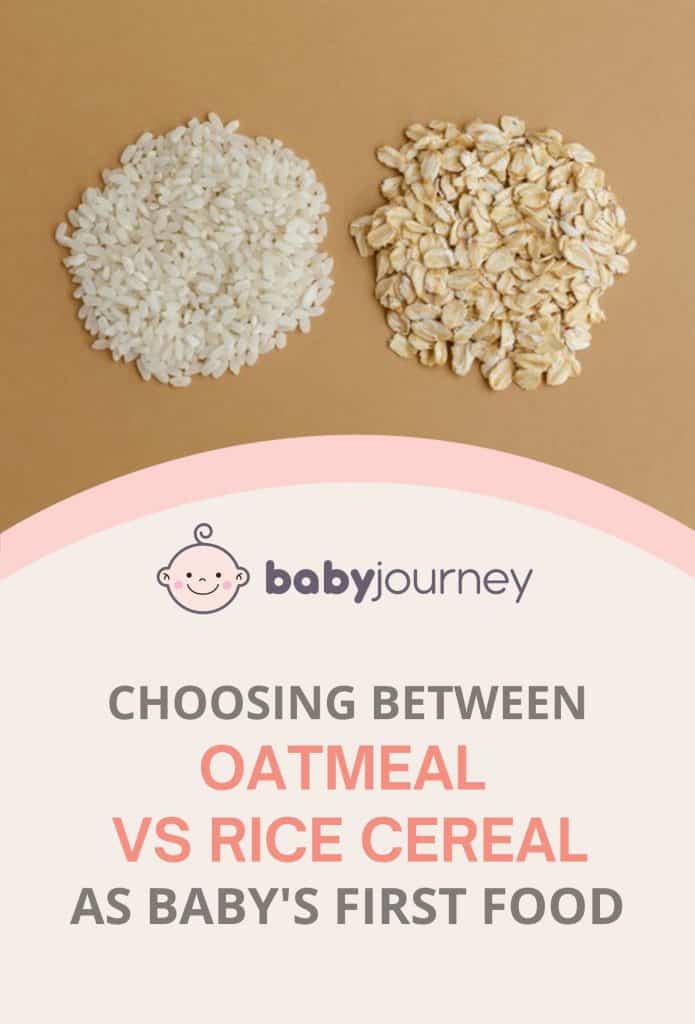
Last update on 2024-04-18 / Affiliate links / Images from Amazon Product Advertising API

